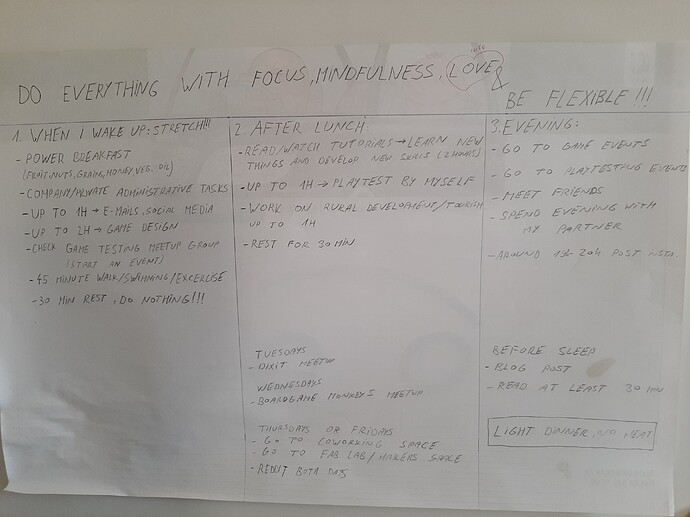It affected all of us, even me and I have had a home office for years now.
Early on I realised it’s not so good to be so isolated at home and decided to go more to various events and seminars of interest. I also expanded my subscription at the coworking space so on some days I could work from there and mingle more. It’s not only the social aspect, it’s meeting like minded people or entrepreneurs, creatives with very different perspective on things…just exchanging ideas and experiences and giving birth to something new 
Each time I would realise something is wrong, I would search within to figure out what it is, then look for causes/solutions. I would write down my idea of the solution on an A2 paper and put it on my office wall, so I would get reminded each day of what is important during that specific period.
Here is an old example (the only one on my computer) of what I do when I realise I got derailed or stuck in habits which aren’t so beneficial for me.
I stay flexible though, if I want to walk - it’s after lunch or dinner. If I want to go swimming, it’s in the morning or before lunch (I don’t do that now unfortunately).
Ofc that A2 changes, depending of priorities, but I keep the old ones

As Nadia and Noemi already said, the phone separation is very important. Managing the exposure to the huge amount of information constantly pouring in, work related or not. I still don’t have my company mail on my phone, in 5% of the cases it would have made things easier because I could be more responsive during busy days outside or when travelling. However, 95% of the time it’s a good thing and if it something urgent it usually isn’t sent by mail. If it is, it just means I or someone else failed at organisation 
@nadia I also have full gear at home but I somehow keep “forgetting” or “not having time” for exercising, HELP! Give me some habit/brain hacks for that. I know it’s really important but, I keep prioritising other things  . The only thing I constantly do are long walks.
. The only thing I constantly do are long walks.
@noemi for mental being me and my partner go to Ardennes every 3 weeks or so, enjoy the weekend off the grid. Nature, peace and lots of physical activity.
We are both used to spending summers on vacation so that means so much to us right now.
Going this weekend to trois points.
Also we do regular events at home every few weeks with the same group of friends. We can host an evening for Edgryders in Bruxelles but considering corona issues, not sure who would come 
I found also one really bad thing about working from home and not creating clear boundaries. People get into a habit of you being accessible all the time, so they slowly start calling and writing to you at the weirdest of times or they become less and less punctual with the schedule and that was very annoying.
Dealt with it easily though, after I implemented similar system the airports have haha. Each person gets a slot, you miss your slot and you are at the bottom of priority.
Each to his own but for me, probably the most important things for mental health are human interaction and movement.
By movement I mean movement of your body, mind, spirit. Keep yourself agile, create new environments for yourself, explore new ideas, concepts, do new things. Movement is essential for evolution. As soon as you stop, you start to decline…the mind numbs, body gets out of balance, both on chemical and energy level.


